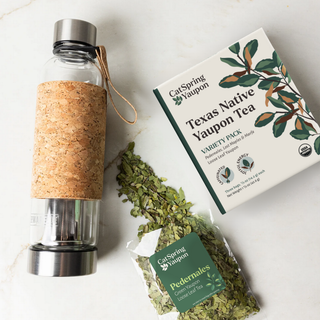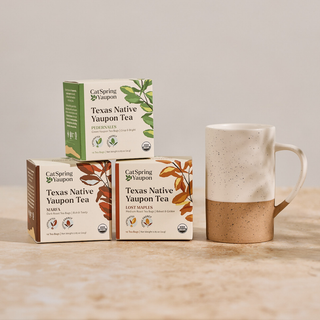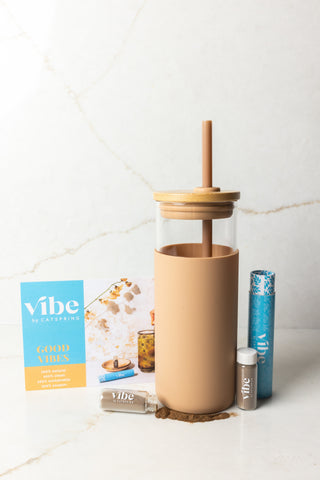Tea is the glue to your Kombucha. Your bacteria and yeast need the minerals found in tea to support your SCOBY during the fermentation process and produce an amazing kombucha. In this guide, we ranked and reviewed the best teas for kombucha, exploring their unique properties, flavors, and health benefits.
If you want to get some for yourself, we have a collection of the best teas for your kombucha in tea bags, loose leaf tea, or iced tea pouches.
What is the Best Tea for Kombucha?
1. Yaupon Tea

First up is yaupon tea, a hidden gem in the world of herbal teas. This native North American tea plant offers a range of health benefits, including immune system support and weight loss. Yaupon is caffeine-rich, making it an excellent alternative to traditional caffeinated teas.
Yaupon’s strong flavor profile stands up well to the fermentation process, ensuring a robust end result. It’s a great choice for those looking to add a different flavor profile to their kombucha.
Benefits:
- No tannins meaning no bitter taste no matter how long you brew the tea.
- With smooth caffeine (we see about 25 mg per serving), the boost is augmented by theobromine and theacrine to give a mental boost
- Mild taste makes it a preferred option for brewing Kombucha.
Try our CatSpring Yaupon tea to craft a delicious kombucha. It’s organic, non-gmo, kosher, sustainably grown, and naturally caffeinated.
Pro Tip: Use whole leaf tea for the highest quality kombucha. The larger surface area of the leaves will release more necessary nutrients during the brewing process.
2. Black Tea

When it comes to kombucha, black tea is a staple. Known for its robust flavor and rich tannins, black tea kombucha is a favorite among brewers. The high tannin content supports the health of the kombucha SCOBY, ensuring a vigorous fermentation process. Additionally, black tea tends to have a higher caffeine concentration than other types of tea, at about 50 mg of caffeine per cup so it’s a great option if you want an energizing drink!
Popular varieties like English Breakfast and Orange Pekoe are excellent choices. Black tea's strong flavor pairs well with the sweet tea required for fermentation, resulting in a balanced and flavorful probiotic drink.
Benefits:
- Create a strong flavor because of how long it has been oxidized.
- Made using fresh ginger root which packs a punch when it comes to healing symptoms of an upset stomach.
- Can be used as a base for 4-5 batches before introducing other tea flavors including fruit flavorings.
Brewing Tip: Whether you prefer tea bags or loose leaf tea, make sure to use hot water to extract the full flavor and benefits from your black tea. Opt for organic tea to avoid any adverse effects from pesticides.
3. Green Tea

Green tea kombucha is beloved for its lighter, more delicate flavor and myriad health benefits. Rich in antioxidants, green tea leaves promote a healthy immune system and can aid in weight loss. The tea plant, Camellia sinensis, provides a clean tea base that’s ideal for fermentation.
Benefits:
- Pairs well with other bases (you can start with black tea or Yaupon and then build with other green tea flavors) or other herbal infusions.
- Light flavors come from using this less oxidized tea.
- Contributes to fresher breath as green tea catechins kill bacteria common in the mouth that are responsible for bad breath.
Top Tip: Use whole leaf or loose tea to avoid small particles of tea, which can cloud your brew. Always brew at the right temperature to preserve the delicate flavors and nutrients.
4. Oolong Tea

Lastly, let’s talk about oolong tea, the perfect middle ground between black and green tea. Oolong tea is partially fermented, offering a unique flavor that’s both rich and nuanced. It’s an excellent base tea for those who appreciate different flavor profiles.
Oolong tea’s semi-fermented nature makes it a good choice for kombucha brewing. It provides a balanced fermentation process, supporting a healthy scoby and resulting in a delicious, well-rounded kombucha.
Benefits:
- Can be used on its own instead of blending like with a green but it also creates a bolder flavor profile than green tea.
- Get closer to your daily nutrition goals with the various minerals (calcium, potassium, and magnesium) found in oolong tea.
Brewing Insight: Opt for loose leaf tea to capture the full complexity of oolong. The larger leaves ensure the best results and contribute to the overall health of your kombucha culture.
Tips for the Best Kombucha Brewing Experience

- Use High-Quality Ingredients: Always opt for organic tea to ensure a clean tea free from pesticides.
- Maintain a Healthy Scoby: A healthy scoby is crucial for successful fermentation. Monitor your scoby’s health and replace it if necessary.
- Experiment with Flavors: Don’t be afraid to mix different types of tea or add fruit juices during the second fermentation for a personalized touch.
- Proper Fermentation: Ensure your kombucha culture is kept at room temperature and away from direct sunlight to promote a healthy fermentation process.
- Use Glass Bottles: For your second fermentation, glass bottles are the best option to avoid any adverse effects from plastic.
The Bottom Line

Stick to a black, green, oolong or Yaupon tea for your kombucha SCOBY. Whether you're looking to make your own homemade kombucha or wondering what brew will taste the best from the store or restaurant, you have lots of options. With a delicious base and simple ingredients, enjoy every refreshing glass!
If you want to get our best tasting tea for kombucha, check out our organic, naturally caffeinated CatSpring Yaupon tea options here.
Medical Disclaimer: This article is for informative purposes only and shouldn’t be taken as medical advice. If you have serious health-related issues you should reach out to a medical professional. While we have studied the scientific research available, this is not intended to diagnose, treat, cure, or prevent any disease.












